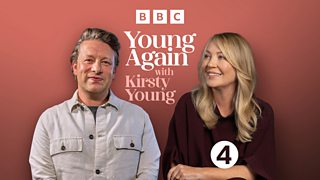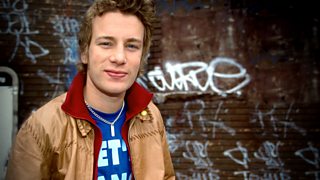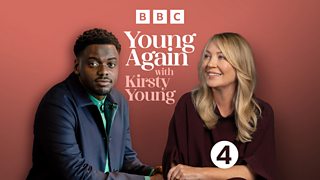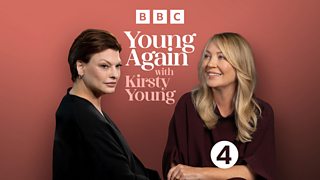Jamie Oliver: Seven things we learned when he spoke to Kirsty Young
In her 91Èȱ¬ Radio 4 podcast Young Again, journalist and broadcaster Kirsty Young takes her guests back to meet their younger selves and asks the question: if you knew then what you know now, what would you have done differently?
Jamie Oliver talks about his life and career, from his first appearances on TV in The Naked Chef back in 1999 to his campaign for better school meals, setting up the restaurant Fifteen and the publication of his 27th cookbook.
Here are seven things we learned...
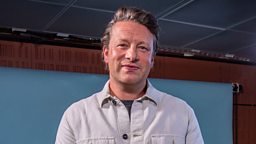
1. Jamie’s parents moved as soon as he was born – from one pub to another
“I've never actually told anyone this – so I was born into a pub next to a council estate that was potentially the roughest in the country. It was incredibly rough. When I say rough, I mean violence – bullets, like all sorts of shenanigans – and I'm not exaggerating,” says Jamie.
“And as soon as I was born, within 36 hours, Dad was offered up a pub in somewhere he'd never been before in North Essex, two hours away... We grew up in a little village in Essex. The M11 had, I think, only just been built, so everyone had proper accents: ‘Alright, boy, how's it going? Everything alright?’ It's like a little village and my home and my house was a pub.”
2. Jamie didn’t realise how special his parents’ pub was until he left home
“I left at 18 going, ‘Thanks, Dad. Amazing! Love you, Mum. See you! I'm going to London – Big smoke!’” says Jamie, laughing.
“And it took three years for me to realise all these things that are contemporary and cutting edge and cool – like the idea of making your own pasta; I’d grown up doing that. I'm like, ‘Oh my God, they were legends.’”
“I knew we were always fully booked but I just thought that was normal. Of course it wasn't. I thought everything that happened there was normal, but I never realised that mum and dad were pioneers. Yeah, like up there!”
It was at Antonio Carluccio’s restaurant that Jamie first met the Italian chef Gennaro Contaldo, who Jamie would later describe as his mentor.
3. He got his work ethos from his dad. And much more
"Dad was amazing,” says Jamie. “He's amazing, a loving dad, but he still has an aversion to people sitting down doing nothing. He feels uncomfortable around idle people and I think I've learned it from him.”
“I think hard work is you have to work hard, and you have to earn your crust.”
“When he'd be outside watering the plants, he'd get up on a bench and he'd water me in bed. And if there were friends doing a sleepover, they'd all get watered too!”
"He used to say, ‘Come on, boy! People die in bed! Up you get!’”
4. Jamie says that cooking saved him from his dyslexia
“At primary school, I hated words, hated reading. I couldn't see a point in it, and I just couldn't get it. And it was the same throughout my whole schooling,” says Jamie.
“In my secondary school it was called ‘special needs’, so you're literally pulled out of class amongst – it was an all-boys’ school, 800 boys – so you’re pulled out of class. It's like, ’Knock, knock, knock. Yeah, can we have Jamie for special needs please?’”
“Cooking saved me. It absolutely saved me... I knew that I could run a starters department and I knew that as a 13-year-old that I was being asked to train 20-year-old graduates of college that section. I could run the pass at 15.”
The pass in a restaurant is the area where food is passed from the cooking staff to the waiting staff and is considered by many to be the most important area in a successful restaurant. It is where presentation and dishes are checked before they are served.
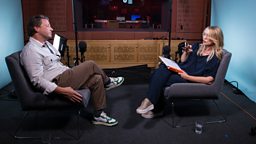
5. He met his wife Jools early in life
“I obviously failed wonderfully at school. Most of my exams were ungraded but I got an ‘A’ in Art and a ‘C’ in Geology,” says Jamie.
“I went to catering college... but I'd have Wednesday half-day and I'd go to the sixth form of my old school, where theoretically I wasn't welcome, but I was there.”
“And one day, this beautiful, tall, brown-haired girl just walked past and then fell over,” laughs Jamie about the first time he saw Jools. “She just tripped over. She's never changed, she's always bashing into things. But she fell over and I went, ‘Oh my God!’ and totally fell in love straight away.”
“But I was very shy and it was at least two years before I was able to even string a sentence together to ask her on a date. Even when I did that, I sounded like Scooby-Doo. Nothing came out right and she went, ‘Sorry? What is it? Are you alright?’“
“We've gone through everything together and it's been a tricky old 23 years as well as amazing. That’s life.”
Jamie and Jools have five children and this year they renewed their wedding vows.
6. Fifteen was a passion project for him and he has no regrets
Following the huge success of three 91Èȱ¬ TV series of The Naked Chef, and the books that accompanied the programmes, Jamie set up his first restaurant Fifteen in London.
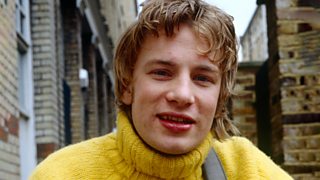
The idea behind Fifteen, a charity, was to train young adults from a disadvantaged background for careers in the restaurant business.
“Naked Chef didn't just explode in the UK, it exploded around the world, so I just felt maybe I could try something a bit different,” explains Jamie in an understated way.
“This wanting to put a bit back was very sincere. Theoretically it bankrupted me for three weeks but luckily I got another royalty statement from the publishers!”
“I knew that if I gave these kids time – and second chances, and by the way, third and fourth,” says Jamie, “We were graduating over 80% of our young people, those 80% of people were still in the game six years later. One of them got a Michelin star and I'm like, ‘I haven't got one. I haven't got a Michelin star. And you got a Michelin star in a pub.’”
7. What would he say to his younger childhood self?
“I'd say, ‘Oi! Listen, school's just a way but it's not the only way.’ Try and talk more to the quiet kids in the class because they're much more interesting than the loud ones."
“Be kind to people. Remember that the best investment you can make in your life is good relationships."
“Find a way to celebrate failure."
“Because I kind of came out of school unconventionally and became – apparently – the second biggest British author [after JK Rowling]. There's always a way. I've never put pen to paper. I've never typed a thing. I've spoken into dictaphones, and I've found other ways.”
“What's important is communication and whether that's through sound or smell or touch or words, like, just as long as you're communicating well, do your thing.”
“But I'd also say, ‘Please don't worry about it, it doesn't matter.’”

